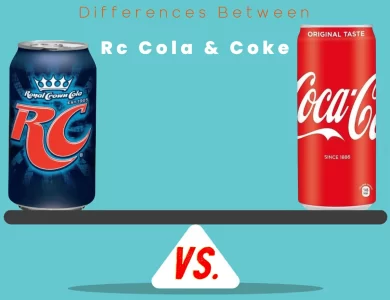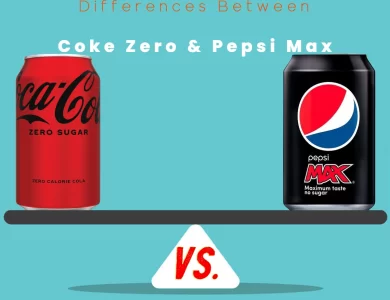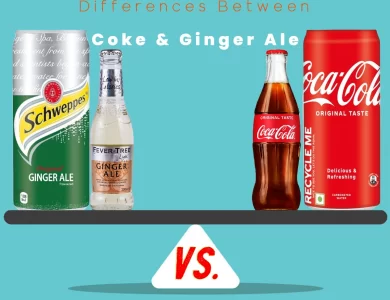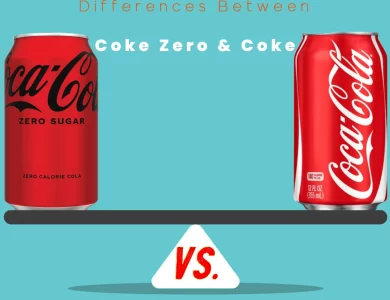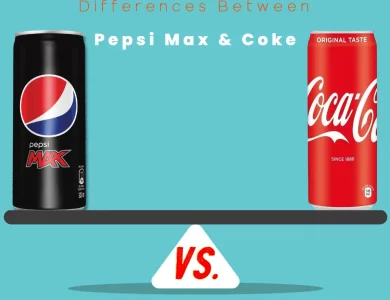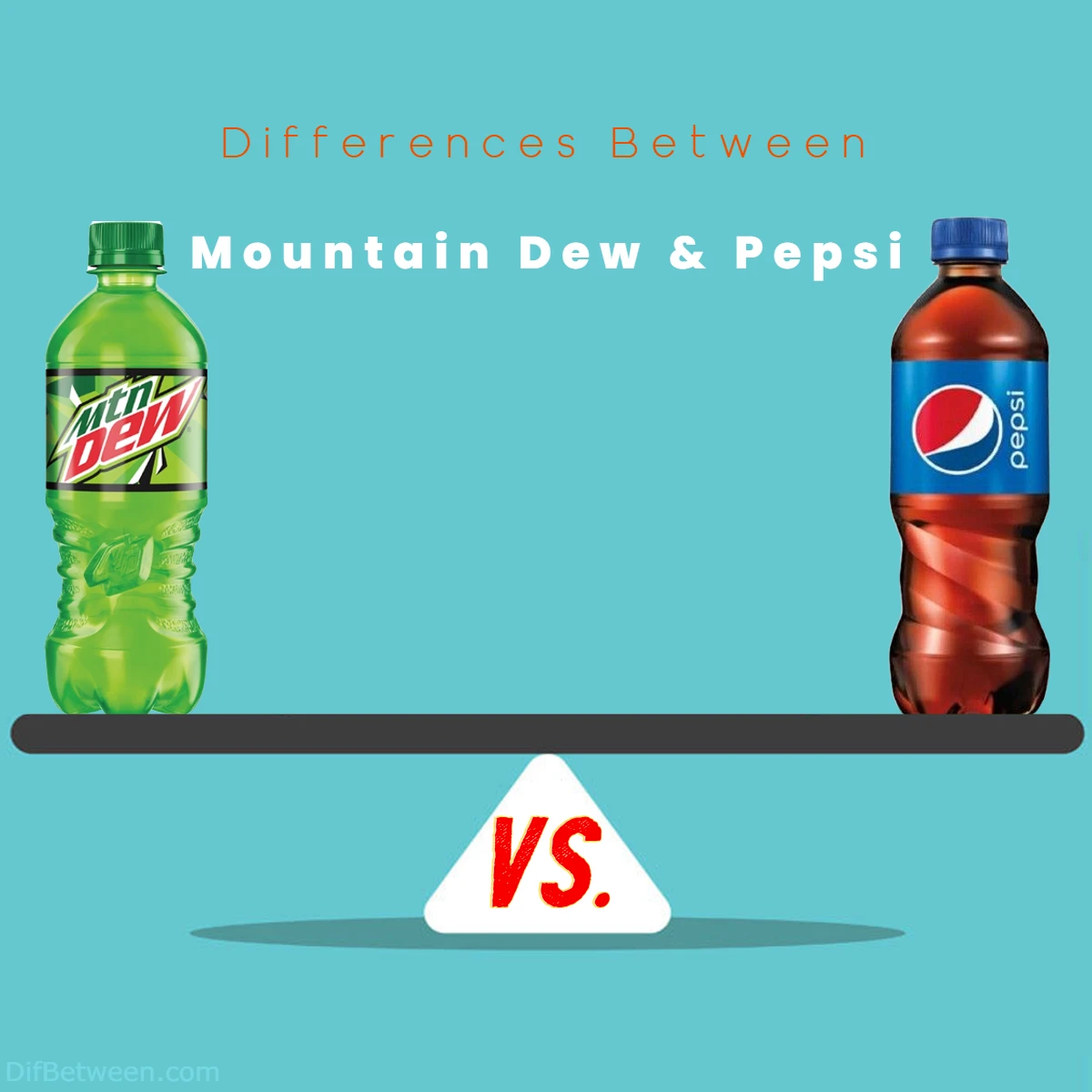
Mountain Dew and Pepsi, two beloved carbonated beverages, boast distinctive flavor profiles and unique brand identities. Mountain Dew tantalizes taste buds with its bold, citrusy burst, incorporating a lively blend of orange, lemon, and lime flavors. In contrast, Pepsi offers a smooth and well-balanced taste, complemented by a touch of caramel and citrus notes. Moreover, Mountain Dew contains higher caffeine levels, making it a favored choice for those seeking an energizing boost, while Pepsi provides a more moderate caffeine lift. Both sodas have captured the hearts of consumers worldwide, with Mountain Dew’s brand identity associated with extreme sports and Pepsi resonating with pop culture and nostalgia. The choice between Mountain Dew and Pepsi hinges on personal taste preferences and the desired soda experience.
| Aspect | Mountain Dew | Pepsi |
|---|---|---|
| Flavor Profile | Bold and Citrusy | Smooth and Balanced |
| Primary Flavors | Orange, Lemon, Lime | Caramel, Citrus |
| Caffeine Content (per 12 fl oz/355 ml) | Approximately 54mg | Approximately 38mg |
| Calories (per 12 fl oz/355 ml) | 170 | 150 |
| Total Carbohydrates (per 12 fl oz/355 ml) | 46g | 41g |
| Sugars (per 12 fl oz/355 ml) | 46g | 41g |
| Brand Identity | Extreme Sports, Adventure | Music, Pop Culture, Nostalgia |
| Packaging and Presentation | Vibrant Green with Bold Graphics | Classic Red, White, and Blue |
| Global Presence | Stronghold in the United States, Varying Popularity Globally | Widely Distributed in Over 200 Countries |
| Variations | Code Red, Voltage, Baja Blast, and More | Pepsi Zero Sugar, Diet Pepsi, Flavored Variants, Etc. |
| Marketing Focus | Adrenaline-Fueled Lifestyle, Online Fandom | Celebrity Endorsements, Cultural Significance |
| Primary Audience | Younger Demographic, Adventure Seekers | Broad Audience Across Generations |
Are you curious about the bold and citrusy punch of Mountain Dew or the smooth and balanced taste of Pepsi? Is caffeine content a deciding factor for you, or are you more drawn to the vibrant packaging and cultural significance of these beloved beverages? Fear not, dear readers, for by the end of this blog, you’ll be equipped with all the knowledge you need to make the perfect choice.
Differences Between Mountain Dew and Pepsi
Flavor Profiles: A Sip of Distinction
Mountain Dew: Bold and Citrusy
Mountain Dew is known for its bold, citrusy flavor that packs a punch with every sip. Created in the 1940s by Barney and Ally Hartman, this one-of-a-kind soda boasts a lively combination of orange, lemon, and lime flavors. The secret recipe for Mountain Dew has evolved over time, leading to the iconic taste that has won the hearts of millions worldwide.
The distinct taste of Mountain Dew makes it a favorite among individuals who crave a zesty and energizing soda experience. The infusion of citrus flavors creates a harmonious blend that caters to those seeking a more tangy and daring soda option. Additionally, Mountain Dew offers various exciting variations, such as Code Red, Voltage, and Baja Blast, each introducing unique twists to the classic flavor.

Pepsi: Smooth and Balanced
Pepsi, on the other hand, offers a smooth and balanced flavor profile that is often described as being slightly sweeter than its counterpart, Coca-Cola. Created by Caleb Bradham in the late 1890s, Pepsi has a rich history that spans over a century. Its recipe has been refined over time to achieve the perfect harmony of sweetness and fizziness.
With a delicate blend of caramel notes and a touch of citrus, Pepsi delivers a mellow and enjoyable soda experience. This well-rounded flavor profile appeals to a broad range of palates, making it a timeless favorite among soft drink enthusiasts worldwide. Pepsi, too, has its own lineup of variations, such as Pepsi Zero Sugar and Pepsi Wild Cherry, offering consumers even more choices to suit their preferences.
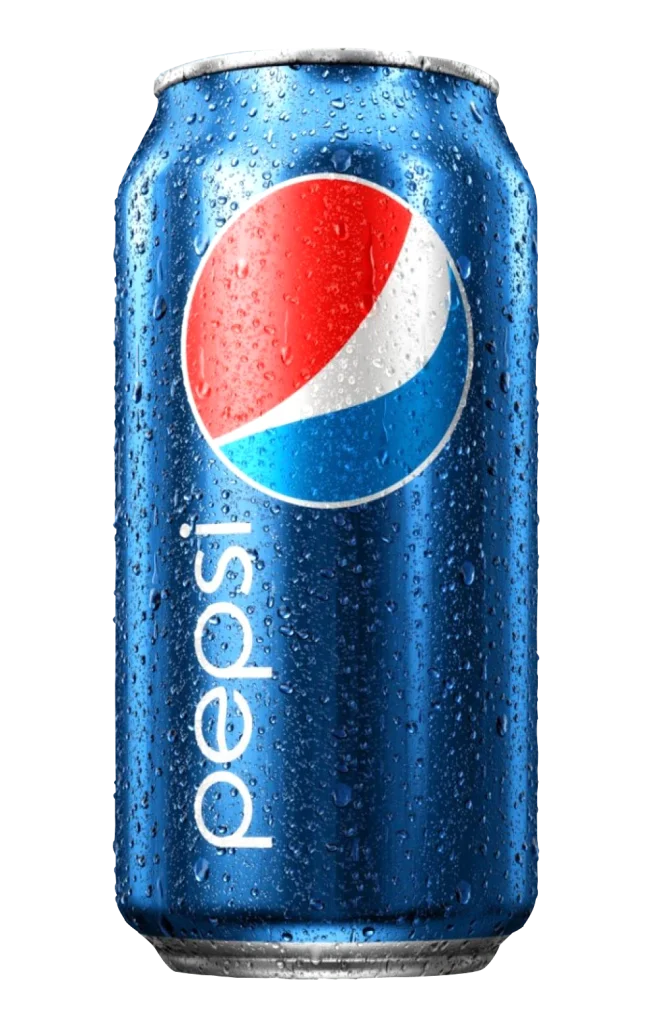
To better understand the differences, let’s take a closer look at the nutritional aspects of these beverages in the table below:
| Nutritional Information (per 12 fl oz/355 ml) | Mountain Dew | Pepsi |
|---|---|---|
| Calories | 170 | 150 |
| Total Carbohydrates | 46g | 41g |
| Sugars | 46g | 41g |
| Caffeine | 54mg | 38mg |
| Sodium | 65mg | 30mg |
Caffeine Content: The Wake-Up Factor
Mountain Dew: A Jolt of Energy
One of the primary differences between Mountain Dew and Pepsi lies in their caffeine content. Mountain Dew is famous for its higher caffeine levels compared to many other soft drinks. With approximately 54mg of caffeine per 12 fl oz (355ml) serving, Mountain Dew is often seen as an energy booster, making it a popular choice among individuals looking for a quick pick-me-up.
The higher caffeine content in Mountain Dew contributes to its reputation as a preferred beverage among gamers, college students, and those in need of an energy boost during busy days. However, it’s important to enjoy Mountain Dew in moderation, as excessive caffeine intake may lead to unwanted side effects, especially for those sensitive to stimulants.
Pepsi: A Soothing Sip
In contrast, Pepsi boasts a lower caffeine content, containing approximately 38mg per 12 fl oz (355ml) serving. While still providing a gentle energy lift, Pepsi’s caffeine level is more moderate compared to Mountain Dew. This makes Pepsi a popular choice for those seeking a refreshing beverage without an overly stimulating effect.
The table below provides a comparison of caffeine content between Mountain Dew and Pepsi in popular serving sizes:
| Caffeine Content (per serving size) | Mountain Dew | Pepsi |
|---|---|---|
| 12 fl oz (355ml) | 54mg | 38mg |
| 20 fl oz (591ml) | 91mg | 63mg |
| 2-liter bottle (2000ml) | 233mg | 158mg |
Brand Identity: Dew or Blue?
Mountain Dew: Extreme Sports and Thrilling Adventures
Mountain Dew has built a distinct brand identity over the years, often associated with extreme sports, adventure, and an adrenaline-fueled lifestyle. The brand’s marketing campaigns have centered around pushing boundaries and living life to the fullest, resonating with a younger demographic that seeks excitement and exhilaration.
The brand has engaged in various sponsorships and collaborations with extreme sports events, video game competitions, and adventure-focused content creators. This has allowed Mountain Dew to carve a niche for itself as the go-to drink for those seeking a taste of the wild side.
Pepsi: Music, Pop Culture, and Nostalgia
In contrast, Pepsi has positioned itself as a brand closely connected to pop culture, music, and nostalgia. With memorable advertisements featuring iconic celebrities, Pepsi has captured the hearts of consumers across generations. The brand’s marketing efforts often revolve around themes of joy, togetherness, and youthful exuberance.
Pepsi has also been a significant sponsor of major music events and entertainment initiatives, further cementing its association with the world of entertainment and cultural experiences. The brand has effectively tapped into the power of nostalgia by revisiting classic ad campaigns and introducing limited-edition throwback packaging.
Ingredients: Dew’s Dew or Pepsi’s Twist
Mountain Dew: The Citrus Burst
Mountain Dew’s ingredients reflect its distinctive flavor profile. The key components of Mountain Dew include carbonated water, high-fructose corn syrup (or sugar), concentrated orange juice, citric acid, natural flavors, sodium citrate, caffeine, sodium benzoate (preservative), gum arabic, erythorbic acid (preservative), calcium disodium EDTA (to protect flavor), brominated vegetable oil, and yellow 5.
The use of concentrated orange juice and the combination of various natural flavors are what give Mountain Dew its zesty and bold taste. However, the inclusion of brominated vegetable oil (BVO) has been a point of concern for some consumers, leading to its removal from the beverage in certain regions.
Pepsi: A Symphony of Ingredients
Pepsi’s recipe showcases a more intricate mix of ingredients to achieve its well-balanced flavor. The primary ingredients in Pepsi include carbonated water, high-fructose corn syrup (or sugar), caramel color, phosphoric acid, natural flavors, caffeine, citric acid, and sodium citrate.
The caramel color contributes to Pepsi’s distinct hue, and the combination of phosphoric acid and citric acid plays a role in achieving the soda’s balanced tanginess. The absence of fruit juices in the ingredients list sets Pepsi apart from Mountain Dew and contributes to its smoother taste.
Market Presence: Dewing It Big or Pepsi Power
Mountain Dew: The Bold Contender
Mountain Dew has established itself as one of the leading contenders in the soft drink market, especially in the United States. Its bold flavor profile, engaging marketing strategies, and association with extreme sports have garnered a massive fan base. The brand’s limited-edition flavors and constant innovation have kept consumers eagerly awaiting new product launches.
Outside the United States, Mountain Dew may have varying degrees of popularity, with some regions embracing it wholeheartedly and others preferring locally favored alternatives. However, the brand’s global presence continues to expand, introducing new audiences to the adventurous taste of Mountain Dew.
Pepsi: The Cola Giant
Pepsi, as one of the world’s most recognized cola brands, holds a dominant position in the soft drink industry. With its smooth flavor and wide appeal, Pepsi has found success in numerous countries around the globe. The brand’s extensive distribution network and consistent marketing efforts have contributed to its enduring popularity.
Moreover, Pepsi’s portfolio includes an array of products, such as Diet Pepsi, Pepsi Max, and various flavored variants, allowing the brand to cater to diverse consumer preferences. The strong presence of Pepsi in both urban and rural areas further solidifies its status as a formidable competitor in the soda market.
Packaging and Presentation: Bottles and Cans Galore
Mountain Dew: Vibrant and Energetic
Mountain Dew’s packaging and presentation perfectly align with its brand identity. The soda is often bottled in vibrant green containers with bold and eye-catching logos and graphics. The packaging exudes energy and excitement, reflecting the beverage’s adventurous and youthful appeal.
Over the years, Mountain Dew has introduced limited-edition packaging featuring collaborations with popular movies, video games, and extreme sports events. These special editions have become collectors’ items, further enhancing the brand’s allure among enthusiasts.
The brand also offers Mountain Dew in cans, featuring the iconic green design, making it a convenient option for on-the-go enjoyment.
Pepsi: Classic and Timeless
Pepsi’s packaging and presentation, much like its flavor, carry a sense of classic elegance. The brand’s logo, known as the Pepsi Globe, has gone through various iterations over time but has always maintained its iconic red, white, and blue color scheme.
The classic design of Pepsi’s bottles and cans has a timeless appeal that resonates with consumers who appreciate the beverage’s rich history. The brand has also released limited-edition packaging and collectible items, but it typically stays true to its classic look, invoking a sense of nostalgia among its loyal fans.
Whether served in glass bottles, plastic bottles, or cans, Pepsi’s packaging remains instantly recognizable and familiar on store shelves worldwide.
Market Reach and Global Expansion
Mountain Dew: Stronghold in the US
Mountain Dew has historically enjoyed significant success in the United States, where it has become one of the most popular carbonated beverages. Its association with American culture and the nation’s fondness for citrus-flavored sodas have contributed to its stronghold in the US market.
However, Mountain Dew’s global presence has seen mixed success in different regions. In some countries, it has achieved widespread popularity, while in others, it faces competition from local brands or other established international sodas.
To cater to diverse markets, Mountain Dew often collaborates with regional partners to introduce localized flavors, appealing to regional preferences and taste buds.
Pepsi: A Global Cola Icon
Pepsi’s worldwide presence is undoubtedly one of its greatest strengths. As part of PepsiCo, one of the largest food and beverage companies globally, Pepsi’s distribution network spans over 200 countries, making it a truly global brand.
Pepsi has invested heavily in international marketing and local adaptations to cater to regional tastes and cultures. This approach has enabled Pepsi to penetrate various markets successfully and gain widespread acceptance across the globe.
Furthermore, Pepsi’s product portfolio, which includes regular, diet, and flavored variants, allows the brand to cater to different dietary preferences and evolving consumer demands.
Cultural Significance and Social Impact
Mountain Dew: Cult Following and Online Fandom
Mountain Dew’s bold and adventurous brand image has garnered a dedicated following that extends beyond the beverage itself. The brand’s association with extreme sports, video games, and internet culture has led to the emergence of a loyal fanbase.
Mountain Dew’s marketing campaigns often feature engaging online content, interactive challenges, and collaborations with social media influencers, fostering a strong sense of community among its followers.
In certain circles, the term “Dew Nation” is used to refer to the collective of Mountain Dew enthusiasts who proudly identify with the brand and its lifestyle.
Pepsi: Iconic Commercials and Celebrities
Pepsi’s long-standing presence in popular culture has made it a prominent symbol of modern society. The brand’s commercials, featuring iconic celebrities and memorable jingles, have left lasting impressions on viewers worldwide.
Pepsi’s cultural significance extends beyond beverages, as it has played a role in significant events, such as sponsoring the halftime show of the Super Bowl, one of the most-watched television events globally.
Pepsi’s marketing campaigns often celebrate themes of unity, joy, and togetherness, leaving a positive impact on consumers and contributing to the brand’s universal appeal.

Mountain Dew or Pepsi: Which One is Right for You?
Choosing between Mountain Dew and Pepsi depends on your taste preferences, caffeine tolerance, and the kind of soda experience you’re seeking. Let’s break down some key factors to help you decide which one is right for you:
Choose Mountain Dew if:
- You Crave Bold Citrus Flavors: If you love zesty, tangy, and energizing tastes, Mountain Dew’s bold citrus profile is perfect for you. The combination of orange, lemon, and lime flavors creates a refreshing and exhilarating soda experience.
- You Need a Caffeine Boost: Mountain Dew contains higher levels of caffeine compared to Pepsi, making it an ideal choice for those seeking a quick pick-me-up during busy days or gaming sessions.
- You Enjoy Extreme Sports and Adventure: Mountain Dew’s brand identity revolves around extreme sports and thrilling adventures. If you resonate with this lifestyle and want to embrace the spirit of daring exploration, Mountain Dew fits the bill.
- You Appreciate Variety: Mountain Dew offers a wide range of exciting variations, such as Code Red, Voltage, and Baja Blast, each adding unique twists to the classic flavor. If you enjoy exploring different soda flavors, Mountain Dew has plenty to offer.
Choose Pepsi if:
- You Prefer a Smooth and Balanced Soda: If you appreciate a mellow and well-rounded flavor, Pepsi’s smooth taste with a touch of caramel and citrus notes is likely to satisfy your palate.
- You Want a Moderate Caffeine Lift: Pepsi contains lower levels of caffeine compared to Mountain Dew, making it a more suitable choice if you’re looking for a gentle energy lift without an intense buzz.
- You Value Pop Culture and Nostalgia: Pepsi’s long history and iconic marketing campaigns, featuring celebrities and music, evoke feelings of nostalgia and joy. If you enjoy being a part of pop culture moments, Pepsi might be your perfect companion.
- You Seek a Widely Available Beverage: As one of the most recognized cola brands globally, Pepsi is widely available in various countries and regions, making it a convenient and familiar choice almost anywhere you go.
Ultimately, the choice between Mountain Dew and Pepsi is a matter of personal taste and the kind of soda experience you desire. Whether you’re in the mood for a bold citrus burst or a classic cola indulgence, both beverages offer refreshing options to quench your thirst. So, go ahead, grab a bottle or can of your preferred soda, and enjoy the delightful rivalry between Mountain Dew and Pepsi! Cheers to your refreshing enjoyment!
FAQs
Mountain Dew offers a bold, citrusy burst with a lively combination of orange, lemon, and lime flavors. In contrast, Pepsi provides a smooth and well-balanced taste with a touch of caramel and citrus notes.
Mountain Dew contains higher levels of caffeine compared to Pepsi. A 12 fl oz (355ml) serving of Mountain Dew has approximately 54mg of caffeine, while Pepsi contains around 38mg per serving.
Yes, Mountain Dew offers various exciting variations, such as Code Red, Voltage, and Baja Blast, each introducing unique twists to the classic flavor.
In a 12 fl oz (355ml) serving, Mountain Dew typically contains 170 calories, 46g of total carbohydrates, and 46g of sugars. On the other hand, Pepsi contains 150 calories, 41g of total carbohydrates, and 41g of sugars.
Mountain Dew is associated with extreme sports and adventurous lifestyles, targeting a younger demographic seeking excitement. Pepsi, on the other hand, embraces pop culture, music, and nostalgia, appealing to a broader audience across generations.
Mountain Dew’s ingredient list includes brominated vegetable oil (BVO), which has been a point of concern for some consumers. However, in certain regions, BVO has been removed from the beverage. Pepsi’s ingredients do not include BVO.
Pepsi boasts a wider global presence, distributed in over 200 countries, making it one of the most recognized cola brands worldwide. Mountain Dew’s popularity is more concentrated in certain regions, particularly in the United States.
Both Mountain Dew and Pepsi have introduced limited-edition packaging and collaborations with popular movies, music events, and cultural moments, enhancing their appeal to fans and collectors.
Both Mountain Dew and Pepsi offer caffeine-free and diet options to cater to various dietary preferences. Pepsi’s portfolio includes Pepsi Zero Sugar, while Mountain Dew offers caffeine-free and diet variations.
In summary, Mountain Dew is known for its bold, citrusy flavor, higher caffeine content, and association with extreme sports. Pepsi offers a smooth and balanced taste, a more moderate caffeine level, and a strong connection to pop culture and nostalgia. The choice ultimately depends on your taste preferences, caffeine needs, and the kind of soda experience you desire.
Read More:
Contents
- Differences Between Mountain Dew and Pepsi
- Flavor Profiles: A Sip of Distinction
- Caffeine Content: The Wake-Up Factor
- Brand Identity: Dew or Blue?
- Ingredients: Dew’s Dew or Pepsi’s Twist
- Market Presence: Dewing It Big or Pepsi Power
- Packaging and Presentation: Bottles and Cans Galore
- Market Reach and Global Expansion
- Cultural Significance and Social Impact
- Mountain Dew or Pepsi: Which One is Right for You?
- FAQs
